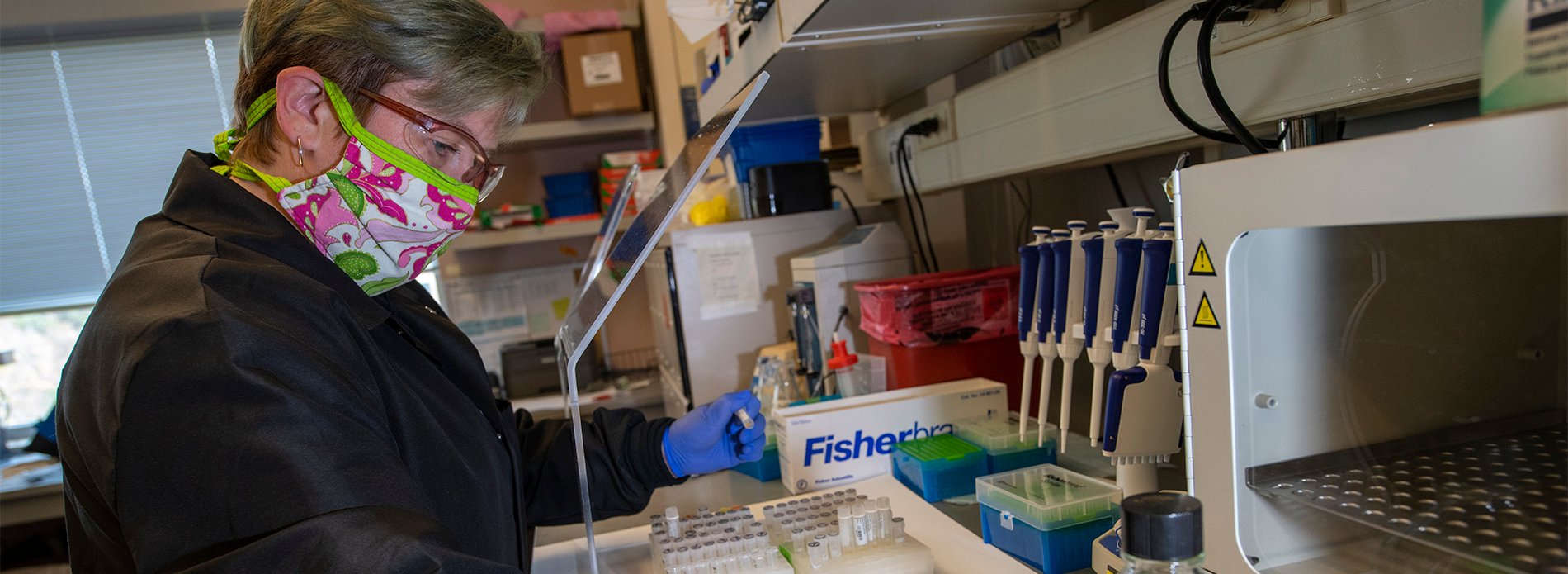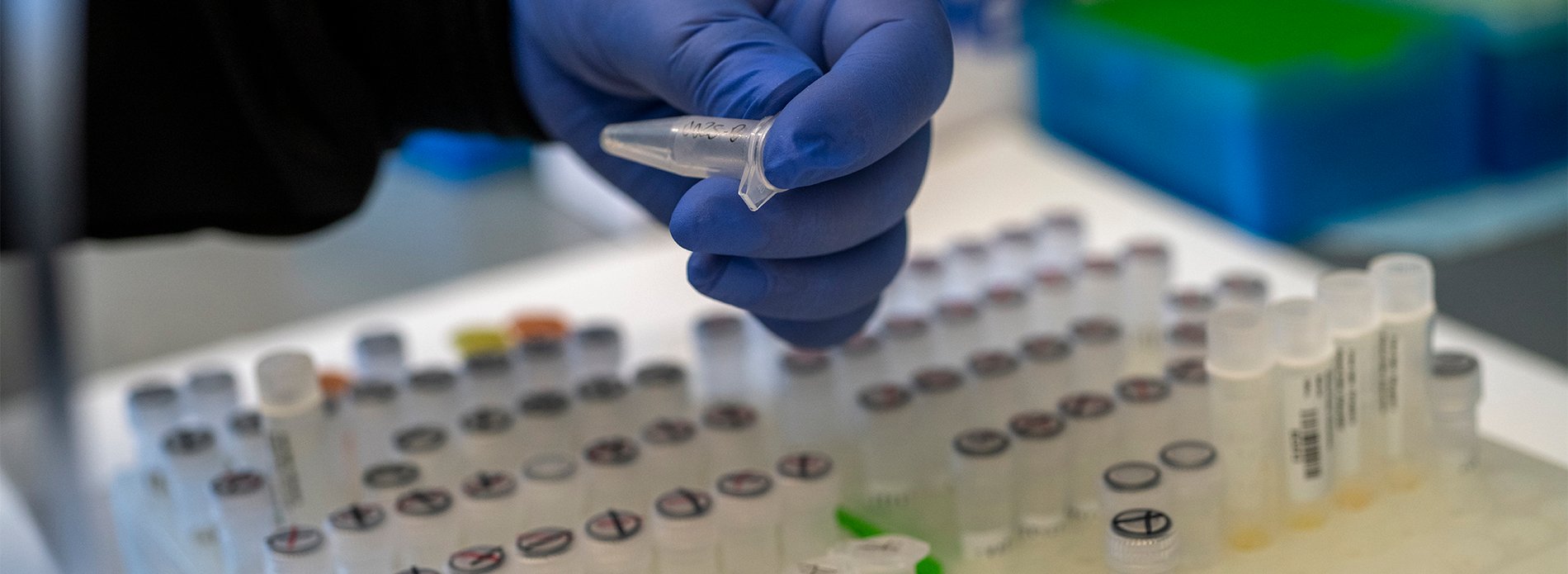Editor’s note: “Our COVID-19 Fighters” is an occasional series highlighting the ways the CU Anschutz Medical Campus community is helping patients and the wider community in the fight against the pandemic. We welcome your story ideas; please share them here.
A one-of-a-kind antibody test targeting the novel coronavirus has joined the arsenal of tools needed in understanding and eradicating COVID-19. The test, described as “among the best of the best,” emerges from an also unique partnership between UCHealth and the University of Colorado Anschutz Medical Campus, a joint venture researchers hope will serve as a catalyst for future projects.
Shortly after SARS-CoV-2 began sweeping the country, a group of scientists from across campus joined in creating its own antibody test and serology program. Using their own equipment and labs, and growing their own proteins (antigens), the researchers built their novel test with two main missions in mind: assuring an ample supply of assays for Coloradans, and enhancing research focused on overcoming the disease.
The group announced June 3 that the test was ready for rollout. “It’s been great to be a part of something so collaborative,” said Ashley Frazer-Abel, PhD, assistant professor of rheumatology in the School of Medicine (SOM). “It represents what we’ve always wanted science to be.”
Test among ‘the best of the best’
Frazer-Abel’s Exsera BioLabs on campus will serve as a testing site for the COVID-19 dual-antigen test. While aimed at supporting primarily UCHealth facilities, outside entities may submit samples for testing. The assay has a specificity of 99.6%, complementing the already high parameter of 99% for UCHealth’s antibody tests.

Ashley Frazer-Abel, PhD, director of the Exsera BioLabs, said the research team is "most proud of" its test's 99.6% specificity.
“The key piece to these tests is specificity,” said Brian Harry, MD, PhD, SOM assistant professor of pathology and medical director of clinical chemistry at UCHealth University of Colorado Hospital. “Specificity is a measure of how often false-positive test results occur. If we see reactivity on high specificity tests, it is likely that patient actually has antibodies to SARS-CoV-2.”
Many of the commercial antibody tests in the field have a specificity in the low 90s that is based on small testing sets, resulting in a positive predictive value of only 50%, Frazer-Abel said. A vast majority of tests also look for only one antigen (a specific protein on a virus that the body forms antibodies against.)
The new test’s 99.6% specificity was determined by testing more than 1,000 pre-pandemic samples and finding only four false-positives, said Harry, a member of the core team that created the test. “I do know that, of all the tests that are out there, the testing that UCHealth and the University of Colorado offer is the best that’s available. And this one is among the best of the best largely because of the dual-antigen approach.”
Potential implications span the state
As UCHealth ramps up testing of patients and healthcare providers, this test will pad the supply of antibody assays, Harry said. Creating the campus’s own test from scratch eliminated reliance on the commercial supply chain, making shortages like those that have plagued providers since the COVID-19 battle began less likely in Colorado, he said.
Other core scientists behind the test include: Dara Aisner, MD, PhD, associate professor in the Department of Pathology and Thomas “Tem” Morrison, PhD, associate professor in the Department of Immunology & Microbiology.

The team plans on ramping up testing quickly, padding testing supply for the state and propelling COVID-19 research.
“This is also part of a number of efforts across campus to understand the incidence of COVID-19 in Colorado,” Frazer-Abel said. Several epidemiological studies using the test are in the lineup, including a healthcare provider screening project headed by Kevin Deane, MD, PhD, associate professor of rheumatology.
The serology group’s work also will support state efforts, with Frazer-Abel already working with Arapahoe County public health officials and the Colorado Department of Public Health and Environment. “We’ve been asked by the CDPHE to look at some of the point-of-care tests and evaluate them in comparison to our assay,” she said.
Combined effort a boost for science
Another unique aspect of the homegrown assay is that it tests for antibodies to both the spike and nucleocapsid proteins in one test.
“The scientific potential of this dual-antigen test makes it unique. It’s something that we are very excited about exploring,” Harry said, noting that the dual antigens can better help inform everything from population studies to vaccine development. “We are also really excited that there’s a lot of interested scientists on the campus that are bringing this testing to their research protocols.”
“The scientific potential of this dual-antigen test makes it unique." – Brian Harry, MD
UCHealth’s CARE Innovation Center supported the combined effort.
“For many of us involved, this has been particularly fulfilling and engaging,” Harry said of the collaboration. “It’s hard to think about it that way, because there are people dying of COVID-19, but the pandemic has brought our community together in ways that it hadn’t before. I hope that this will continue even as we resume a new normal.”
Photo at top: Thomas “Tem” Morrison and his lab provided the proteins and monoclonal antibodies for the new test.

.png)
.jpg)
